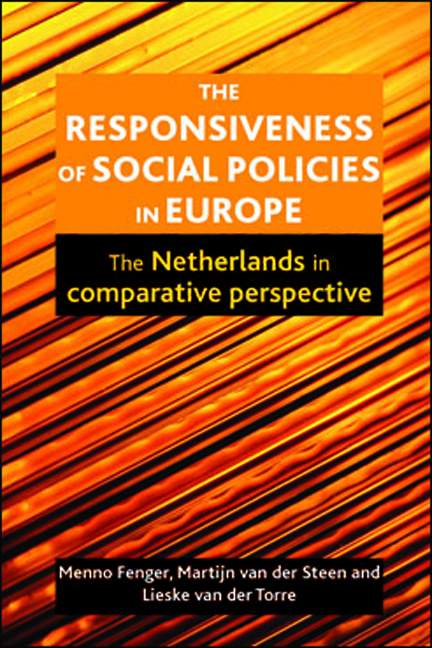Book contents
- Frontmatter
- Contents
- List of figures and tables
- About the authors
- Preface
- one Introduction
- two Responsive policies in contested welfare states?
- three A framework for analysing policy responsiveness
- four The responsiveness of social assistance policies
- five The responsiveness of labour migration policies
- six The responsiveness of sheltered work policies
- seven Conclusions: the responsiveness of social policies in three domains
- References
- Index
four - The responsiveness of social assistance policies
Published online by Cambridge University Press: 01 February 2022
- Frontmatter
- Contents
- List of figures and tables
- About the authors
- Preface
- one Introduction
- two Responsive policies in contested welfare states?
- three A framework for analysing policy responsiveness
- four The responsiveness of social assistance policies
- five The responsiveness of labour migration policies
- six The responsiveness of sheltered work policies
- seven Conclusions: the responsiveness of social policies in three domains
- References
- Index
Summary
Introduction
As has become clear from the previous chapters, this book sets out to explore when, how and why social policies respond to external challenges. This chapter specifically focuses on the domain of social assistance. Various authors have argued that the variety of policy measures that are included under the label of ‘social assistance’ prevents a precise definition of what social assistance is (see Gough et al, 1997; Ditch, 1999; Saraceno, 2002). Building upon Gough et al (1997: 18), in this book we define social assistance as the means-tested or income related benefits to which eligibility is dependent on an assessment of current or recent income and/or assets and which serve as a ‘last resort’ within social protection systems. In general, social assistance schemes have two important goals. The first goal is to prevent extreme hardship among those with no other resources by providing a guaranteed minimum income (Ditch, 1999: 60). The second is to prevent social marginalisation and exclusion of those people with no other resources. National systems clearly vary in the ways they combine these two goals, but elements of these two ambitions may be found in all countries with social assistance schemes.
Ditch (1999: 59) states that within social assistance schemes, three types may be identified. The first is general assistance which is aimed at providing cash benefits to all (or almost all) people below a specified minimum income standard. The second is categorical assistance which provides cash assistance to specified groups like families, young or older people. The final type is tied assistance, which provides access to specific goods or services in either cash or kind. Housing assistance, free school meals or food stamps may be included in this last category. Throughout Europe not only may a wide variety of social assistance schemes be observed, but the ways in which these systems have evolved also differ remarkably.
This chapter analyses the nature, extensiveness and background of changes in social assistance policies there have been since the 1990s, the extent to which these changes can be attributed to changes in these policies’ environment and the consequences of these changes for citizens’ evaluations of the policies.
- Type
- Chapter
- Information
- The Responsiveness of Social Policies in EuropeThe Netherlands in Comparative Perspective, pp. 65 - 94Publisher: Bristol University PressPrint publication year: 2013



